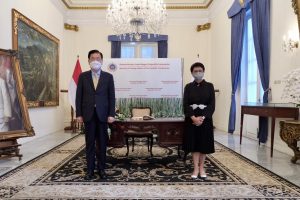Last week, South Korean Foreign Minister Chung Eui-yong undertook his first visit to Southeast Asia since taking up his post. The visits to Vietnam, Singapore, and Indonesia were initiated to strengthen the implementation of South Korea’s New Southern Policy (NSP) and to reinforce cooperation on several pressing issues, such as pandemic control and recovery.
On his third and last stop in Jakarta on June 25, Chung met with his counterpart Retno Marsudi and President Joko “Jokowi” Widodo, as well as paying a visit to the ASEAN Secretariat. The discussion with Retno centered on health cooperation, in particular, the development of vaccines, drugs, and diagnostic tools to help combat COVID-19. In a statement, Retno also called for the stronger protection of Indonesian sailors employed in South Korea, demanding more secure conditions and a safe return guarantee.
During his meeting with Jokowi, Chung re-iterated that Indonesia was a “core” partner of President Moon Jae-in’s NSP and pledged to enhance mutually beneficial cooperation in fields including defense. Indeed, he said that the defense sector could be regarded as a “symbol” of the two nations’ converging interests. Jokowi responded by saying that South Korea was one of Indonesia’s most important relationships and professed himself to be very satisfied with the extent of Korean investment in Indonesia.
That meeting signals two critical things. First, it shows that South Korea is now trying to expand its cooperation with Indonesia beyond just the health and economic sectors. Second, it shows that Jokowi continues to prioritize economics in his dealings with Seoul. It is probably true to say that Indonesia-South Korea cooperation has reached new heights under the leadership of Moon and Jokowi, as indicated by the signing of the Special Strategic Partnership in 2017 and the Indonesia-Korea Comprehensive Economic Partnership Agreement last year in the middle of pandemic.
Both states are now facing a series of more complex and intractable challenges. The COVID-19 pandemic, climate change, and the growing rivalry between the United States and China have commanded special attention from both governments. Apart from external disruptions, the economic and political implications of COVID-19 also need a full concentration. Domestically, both leaderships are troubled with a declining trust toward their governments and escalating sociopolitical tension. This situation prompts questions about the future of Seoul’s New Southern Policy, and whether it will be able to fulfill its expectations in the case of Indonesia in the final year of Moon’s presidency.
Since its formulation by Moon’s administration in 2017, South Korea’s NSP has been criticized on a number of grounds, including for its lack of clear priorities, its exclusive nature, and its overemphasis on economic and social issues, as well as the opaque assessment of the policy’s impacts. The unclarity of the NSP success rate pushed some to question whether the outcomes would have happened whether or the NSP existed. Seoul has since responded by introducing the NSP+, which contains seven more specific initiatives.
For Indonesia, the fifth initiative, “enhancing quality of life through infrastructure development,” might be the segment of the NSP that is most in line with Jokowi’s domestic priorities. South Korea represents an important source of diversification for Indonesia in terms of its infrastructure development. Recently, the two governments held talks on developing the Bali light rail transit system and the fourth phase of the Jakarta MRT. These talks re-affirmed Indonesia’s efforts to reduce its reliance on partners like China, Japan, and the United States.
Geopolitically, it is unclear how the NSP+ fits in to the ASEAN Outlook on Indo-Pacific, the Southeast Asian bloc’s response to the Indo-Pacific strategy formulated by the United States. The goals of the two concepts arguably correspond to a certain degree, but Seoul’s ambition for regional peace and security has been arguably hampered by external geopolitical constraints and the limitations of the NSP on this question, particularly its “peace” pillar. As a treaty ally, the U.S. continues to play a determinant role in Seoul’s security outlook, and the government must therefore be cautious in managing this sensitive sphere.
With the challenges of the pandemic likely to overwhelm other security issues, both countries need to expand their defense-based cooperation, especially in order to address nontraditional threats, including disaster management, cybersecurity, and climate change. The “green” component of the NSP is currently minimal, while Indonesia has set its sights on a green and sustainable economic recovery from the effects of the pandemic. It is therefore necessary to engage more discussions about the challenge of climate change as the two countries between them have more than enough resources to address this issue.
In terms of people-to-people relationships, the awareness and understanding of Korean nationals about Indonesia needs to be improved. Just recently, the K-drama Racket Boys, produced by South Korea’s SBS TV, upset thousands of Indonesians with its discussion of issues such as supposedly bad-mannered Indonesian hospitality. This offered the lesson that domestic sensitivities are a critical part of managing the bilateral relationship, and suggested that the NSP should not only be directed at enhancing ASEAN nationals’ understanding of South Korea, but vice versa.
Most importantly, the implementation of the NSP cannot be the exclusive reserve of the South Korean government. The inclusion of non-government actors is essential to ensure that “people,” as the major stakeholders of the bilateral relationship, are listened to and involved. The Indonesia-Korea NSP Young Professionals Program, established in 2021, is an excellent example of how young voices can be incorporated into the development of bilateral relations. Moon has one year left to achieve his signature foreign policy initiative, but there is more to Indonesia-South Korea engagement than the NSP, and many more ways in which the two nations can move an important relationship forward.

































